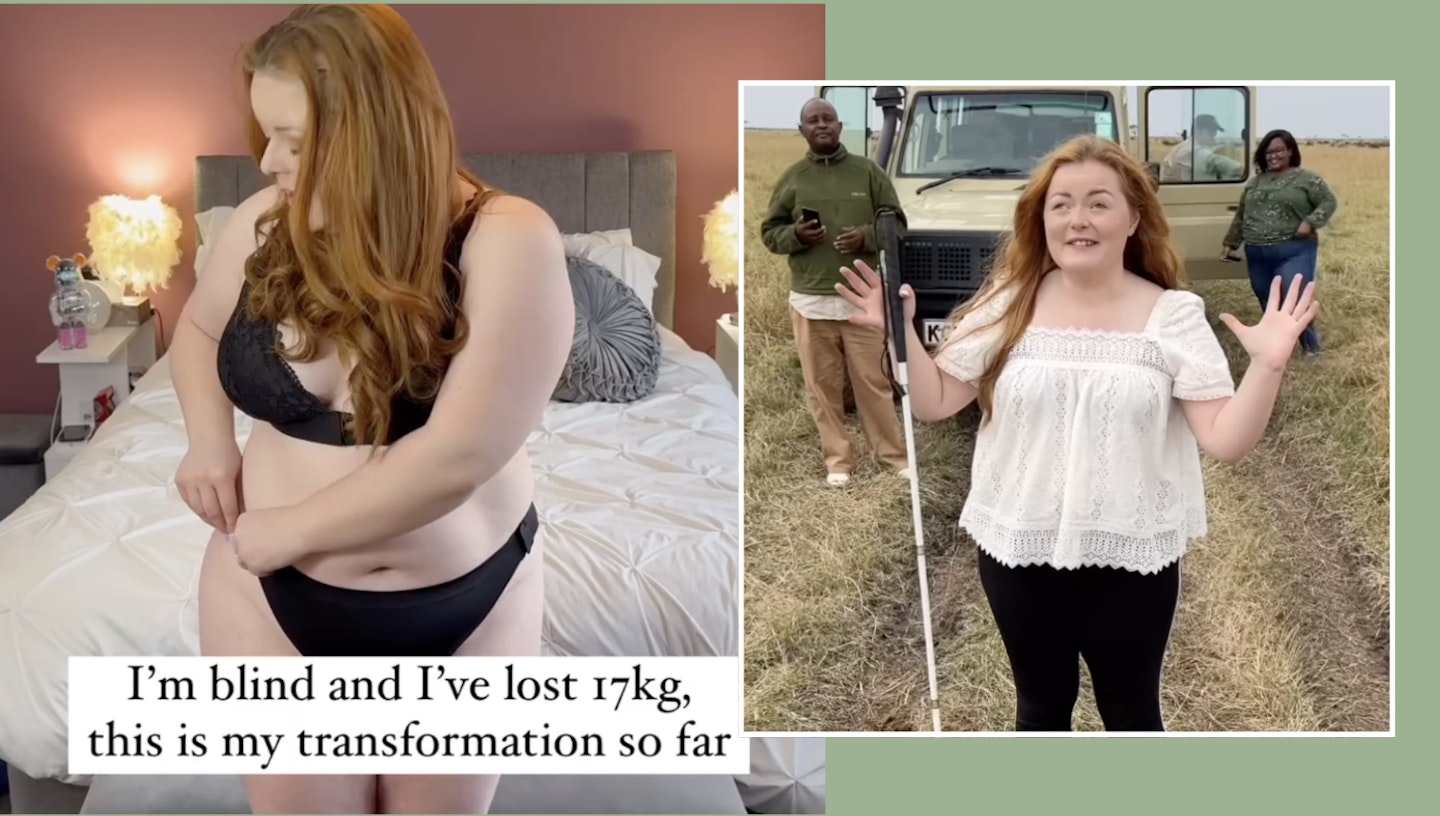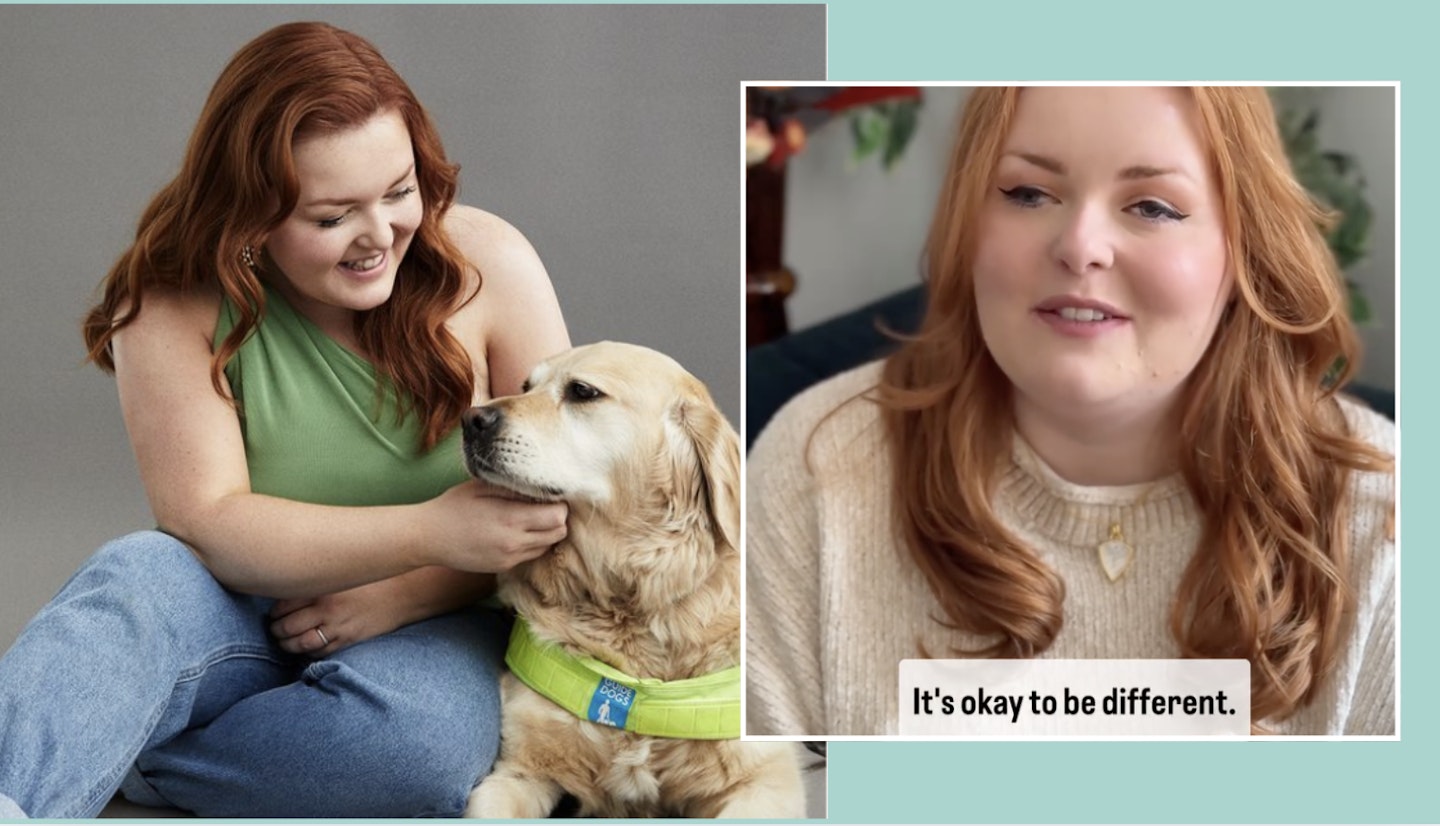It's been almost a year since Lucy Edwards began her weight loss journey to qualify for NHS-funded IVF. She's now just one kg away from achieving a Body Mass Index (BMI) between 19 and 30, bringing her one step closer to becoming a mum. To say the journey has been challenging would be an understatement, especially since Lucy is blind.
The disability activist and BBC Journalist opens up to us about her health and wellness journey, which she hopes will lead to motherhood, her thoughts on giving birth without sight and how blindness will never define her.
The journey to IVF
Born with a rare condition called Incontinentia Pigmenti (IP) Lucy completely lost her vision when she was 17 years old. Since then, she's had to face a barrage of bullying and discrimination, but has learnt to ignore the negativity by posting about her positive experiences as a blind woman.
Despite being open, honest and often vulnerable, the 29-year-old was shocked at the reaction when she spoke about her desire to become a mum and losing weight for IVF. “Initially, when I posted videos that I wanted to be a mother, I would get a storm of comments. People would say, ‘You need to be sterilised.’ A lot of people don't agree with me having children, and I just thought ‘Screw this,’ I'm going to publicise it as much as I can,” she says. She also wanted to try and change the narrative around how people see her as 'less than' and show how competent she actually is.
While some people may think Lucy is using IVF in the UK to simply avoid blindness, it couldn't be further from the truth. "If I had a blind baby, it would be the best gift in the world," she says, but for her, it’s a lot more complicated.
By creating an embryo through IVF, she can undergo PGT-M (Preimplantation Genetic Testing for Monogenic disorders), a screening procedure designed to prevent the transmission of an inherited genetic condition. In her case, if she were to have a boy, the baby may not survive. "My grandma had nine miscarriages, and they were all boys, so from a viability perspective and for the self-preservation of my body, that's why I'm doing it." The procedure would ensure that only the embryos free of the genetic condition would be transferred back into her womb.
Although it presented yet another obstacle, with all the adversity life had already thrown at her, Lucy was ready to tackle it, but didn't want to rush the process. She spent time working with different PTs until she found the one who really understood her and her blindness. “I've been doing it slowly...I wanted to make sure that I was strong, had muscle and I wanted to make sure my body was ready for it (pregnancy)," she admits.

"It's been a long-drawn-out process, but it was about literally stripping back my diet,” she says. “I have upped my protein significantly, making sure I have at least 60g a day. I’ve incorporated protein rolls, protein pancakes, protein banana loaf that we make at home using vital wheat gluten and protein powder. I try not to snack and have lemon and ginger tea when I get hungry. My Stanley mug is a lifesaver, I have lots of water and make sure to have my vitamins. About half my plate is vegetables or salad with each meal to fill myself up with healthy things.”
The results speak for themselves: Lucy has dropped three dress sizes, and while we can all see the visible changes, navigating it without sight makes it a totally different experience for the social media influencer. Without mirrors and scales to celebrate milestones, how does she process the physical change when she cannot see the results? "I know that in my body I feel healthier, and I can run longer, and I can lift more weights, and everyone's telling me, 'Oh, you look great,' but until I put on those clothes - and I don't do it all the time - it's a shock. Some clothes I can wrap around me twice now, and it blows my mind. That's because I can't look in the mirror."
Blind not broken
Lucy’s rare condition runs down the female line of her family, so her mum and grandma also have it, but they never lost their vision. For the Birmingham-based influencer, it manifested as lumps on her skin and doctors were baffled with her condition. She was eventually diagnosed with IP and lost vision in her right eye when she was 11. She lost vision in her left eye seven years later while studying for her A Levels. It left Lucy devastated, depressed and she also suffered from a mental breakdown. “If I'm honest, I did feel isolated. I felt weird. I felt…not very accepted and I did feel different.”
It took a very long time for Lucy to accept her disability and she believes it was deeply rooted in the social model of disability, leading her to believe she was 'broken' for years. Her medical appointments focused on her ‘faulty’ vision, which then manifested her to have an internal belief of ableism that she had to work hard to break through.
“Crawling out of bed, getting into a routine with my guide dog and putting one foot in front of the other was the start of rebuilding my life. I do genuinely believe that I'm not broken anymore. It's taken so many years for me to believe that and have the courage to say that,” she admits. “I always say, ‘The world around us needs to be fixed and it's not me that needs fixing’, and that's what I truly believe.”
Her husband Ollie has been her rock and Lucy says that her younger sister Alice, has been one of her biggest cheerleaders. “My sister has autism and she's so analytical and can describe colours in such a gorgeous way. I think her disability really helps mine,” she explains. “I don't think I'd be posting online if it wasn't for Alice. She’s like the family mirror and helps me with my makeup routine. She also works for me and my husband, so she edits all our videos. If it doesn’t get past Alice, it doesn’t get anywhere.”
Visualising motherhood without sight
We discuss how she imagines pregnancy and motherhood (when it happens) as a blind person. It's clear some of her worries stem from practical challenges, like baby bottles not being accessible or labelled -something she's actively advocating to change. Other things she knows will take a toll on her. "It would be a lie if I didn't overthink about breastfeeding. I really want to breastfeed, but I'm not going to see those physical changes in my body and my boobs having milk. I just have to make sure that I'm being kind to myself."

Controversially, it's the day she gives birth that she's looking forward to the most. "I feel a little bit sick about every single big event in my life. It's like 'I love blindness, and I hate blindness'. On these days, it really highlights that I don't have vision, but reframing it is what makes my life so fulfilling." This may seem a little premature, given that she’s not pregnant, but it’s this kind of vivid visualisation that helps her navigate and plan her life without sight. "All these emotions are so overwhelming, and I think that's what's going to happen with my baby. I'm going to have all these hormones rushing through me and all I'll want to do in that moment is have my eyes work for me…even though that's a valid emotion, I'm not going to dwell on it. Instead, we're going to think about how gorgeous they smell and how they're crying...”
By embracing every emotion – the joy, the fear, and even the moments of wishing for sight but reframing it to focus on the richness of her other senses and experiences, she's paving her own path to parenthood that is uniquely hers and we're excited to watch her next chapter unfold.
About the author
Keya Modessa, is our Senior Digital Writer and brings over a decade of experience from the digital realm to Mother&Baby. As a mother of two, Keya understands the joys and challenges of modern parenthood and uses her own experience, to give practical advice. Keya has worked across national publications including glossy women's mags, Food and Travel, and more recently as digital lead for Muddy Stiletto
